By Noor Adilah (17S06B) and Nadiya Nesseer (17S03B)

Ever so often, we get to know of RI students and staff who have gone over and above their daily obligations in school to channel their time into volunteering and service for others.
A quick straw poll shows that roughly 30% of the RI population, including teachers, currently commit regularly to service work for a variety of different causes. Such service work may come in conventional forms – when staff tutor at youth outreach organisations, or volunteer at community centres; to the less conventional – students who volunteer to
teach migrant workers English, teachers who volunteer at marine conservation centres or staff who help out with Meet-The-People Sessions. Some students even choose to join service CCAs such as the Interact Club, Community Advocates or enrichment programmes like International Service Learning Enrichment (ISLE), to commit regularly to the practice of volunteering and spreading awareness about the causes they involve themselves in.
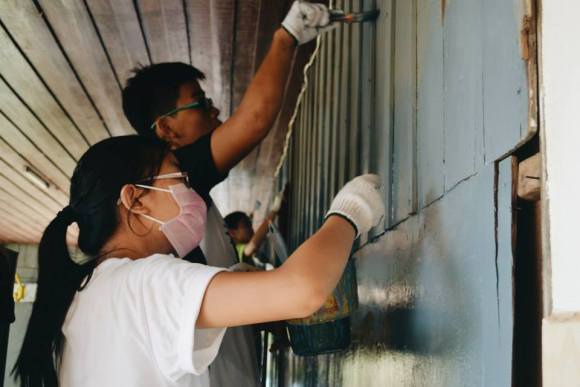
Ideally, volunteering allows for us to involve ourselves in ways that affect positive change and address the underlying issues present in our society today. Volunteering strips away the insularities and predispositions that we have and brings us closer to the realisation that we, as individuals, have a deeper purpose and obligation to others – by working without reward so that those less privileged than us may be accorded their rights to welfare, dignity, opportunity and fulfillment.
We spoke with Shermaine Ng, an alumna of RI, who started engaging in volunteer work as part of the RI Interact Club.
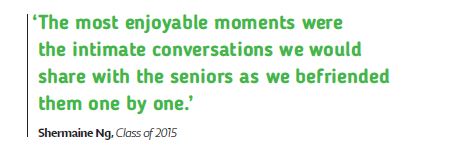
Shermaine regularly volunteered with a team of other Interactors at the Sunlove Home Dementia Daycare Centre, where interactions with the elderly reminded her to adopt a broader perspective towards her everyday life as a Rafflesian.
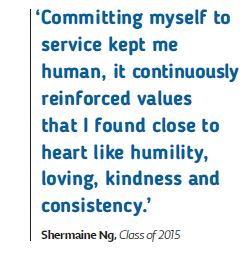
Urging more Rafflesians to step up and give back to the society, Shermaine hopes that more would advocate for volunteerism by sharing the volunteer commitments they have and how they make service a way of life. For her, this is a pivotal role that current volunteers should play, so as to raise awareness about the importance of volunteering.
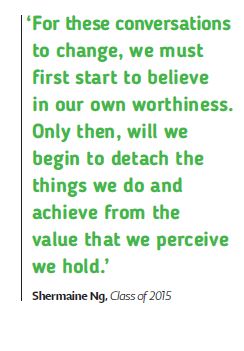
Despite how fulfilling and honourable the task of volunteering may seem, there are a number of legitimate concerns that volunteers – both students and teachers alike – have to confront and accept while volunteering. An anonymous student elaborated on the limitations of student volunteerism which, to him, is inherently less effective than volunteering as an adult.
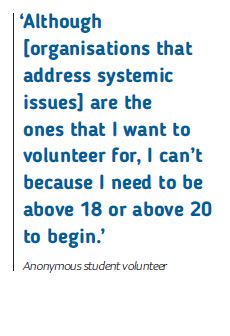
Another pragmatic, but essentially important concern that many have, especially teachers, is that taking short periods of time to volunteer outside of work may not produce a lot of sustained, meaningful, change. Often, spending a short amount of time outside of school or work to conduct an unskilled task cannot realistically make that much of a difference, unless the work is highly personalised.
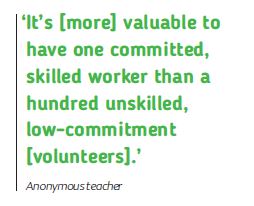
Raffles Community Advocates (CA), a service CCA dedicated to advocacy and direct service for migrant workers, underprivileged children and the mentally ill aims to change this lack of training amongst student volunteers.
According to Mr Steffen Toh, a teacher in charge, students in CA are constantly surrounded by ‘a warm, collegial and supportive community [where] trust is placed in [their] passionate advocates’.
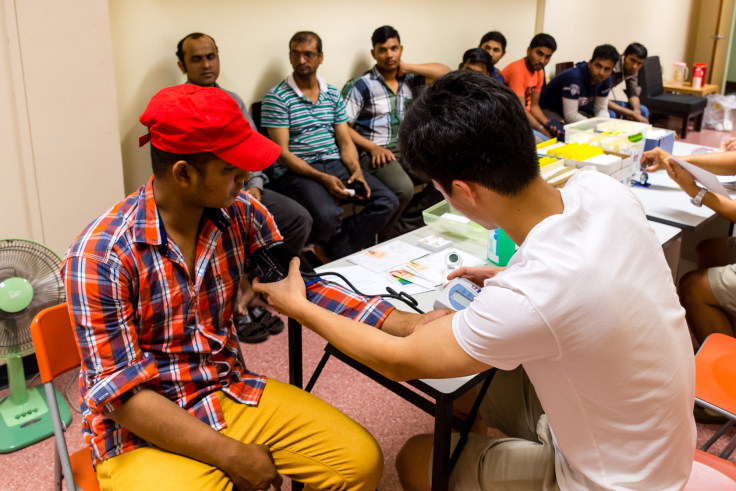
Students are encouraged to constantly educate themselves by attending civic society events like the recent Apa Itu Activist? event organised by the Association of Women for Action and Research (AWARE). They also constantly find opportunities to share their own experiences and knowledge about what it means to advocate and volunteer through A Day In the Life Of An Advocate sessions. In Community Advocates, students are encouraged to not only make service to others an obligation, but an experience that can always be made better with constant reflection and training.
Unfortunately, the same enthusiasm for volunteer training is not shared amongst all student volunteers in RI. Many student volunteers do not understand the importance of training to ensure that sustainable and effective change is created. The implications of
untrained volunteering, especially from individuals who possess a careless ‘anything goes’ attitude can be disastrous.
Another unhelpful form of volunteering is ‘voluntourism’, practised by untrained volunteers who are looking for ‘new experiences’ by volunteering in developing countries. Giving out wristbands and painting classrooms for a month, then getting obligatory selfies with orphans before flying back home is hardly sustainable or positive – in fact, in many cases, these acts of ‘selflessness’ cause more harm than good – the impermanence and transience of voluntourism can exacerbate existing problems in these foreign countries and contribute to a system which relies on short-term help instead of long-term systemic changes.
.jpg?sfvrsn=28273017_0)
This same negative attitude may be echoed in RI’s own overseas volunteering programmes. The International Service Learning Elective Programme (ISLE) consists of students and teachers who conduct a project every year which involves developing an overseas community, Ms Ruth Ong who oversees the ISLE programme, spoke about some of the harmful attitudes that are present amongst some of the students when they intend to conduct overseas volunteering work.
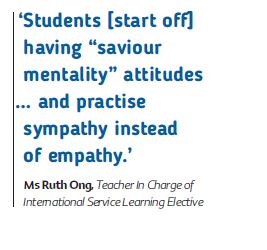
However, the ISLE programme ensures that these harmful ways of thinking are quickly addressed through various training programmes and courses. Mr Yang Haojin states that
such sensitivity training has educated students to become better volunteers and ensures that the service they do does not come off as condescending, but rather as an exchange of ideas. ‘In ISLE, we are careful with our choice of words. We try not to use words like “help”, “beneficiaries” etc. Although inadvertently they do come out from time to time, we always encourage the view that the entire project is one that of partnership – as equals.’
Following the same train of thought, Raffles Community Advocates also aims to train its members to constantly re-evaluate the work that they do, so that Advocates can constantly improve the advocacy and the direct service that they do for migrant workers, the mentally ill and underprivileged children. Mr Steffen Toh says that ‘What we can do … is to thoroughly understand the situation from the perspectives of all key parties involved without bringing to the fore any preconceived notions of our own.’
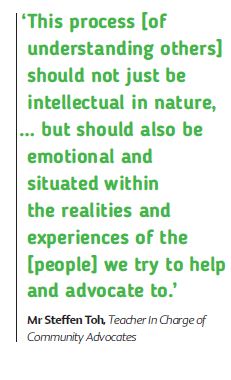
From all perspectives, volunteering as a part of one’s CCA, Monday Elective or even on an individual basis requires a lot of work on behalf of the volunteer – not just to commit to the practice of service, but out of a constant need to reflect on and realign one’s own beliefs. This makes volunteering a dynamic experience, where volunteers and beneficiaries change over time, together.
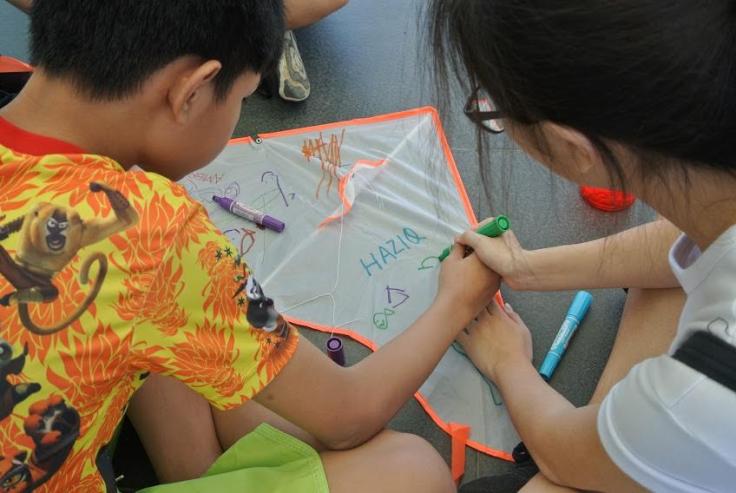
Anyone can be a volunteer, but it takes high levels of empathy, energy and courage to connect to others, to work tirelessly in championing a cause and to make a real difference.